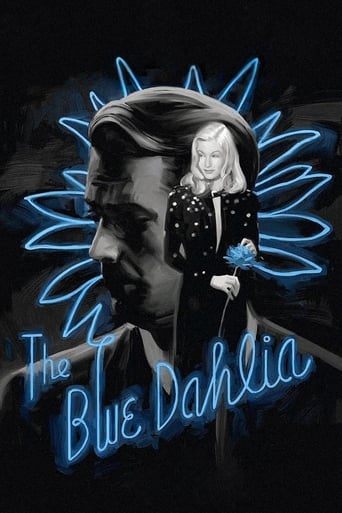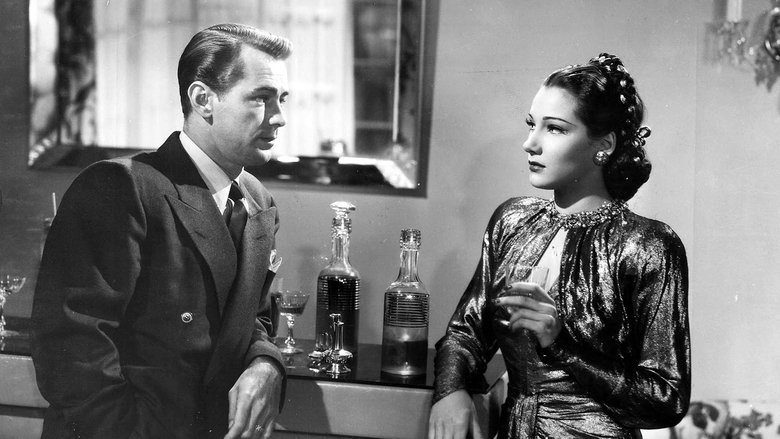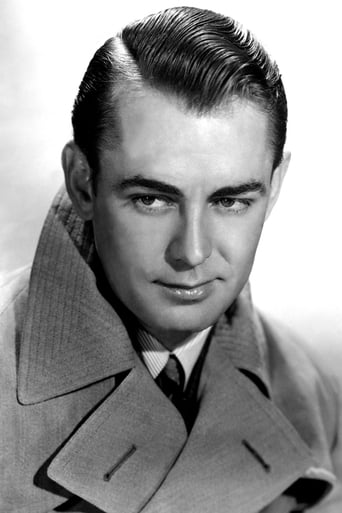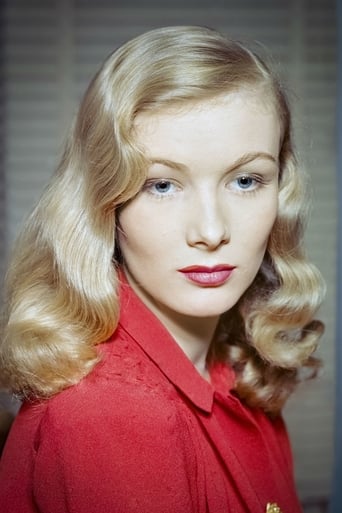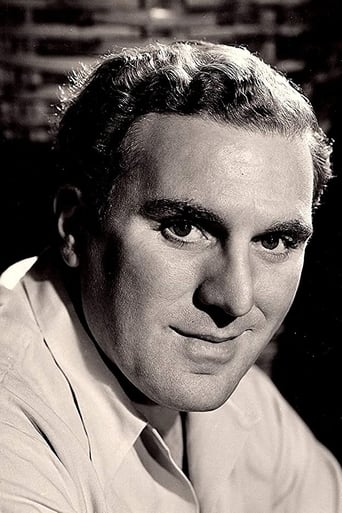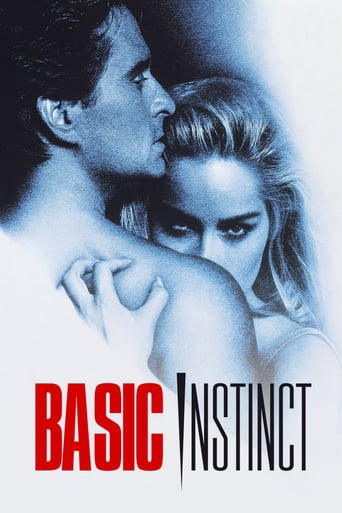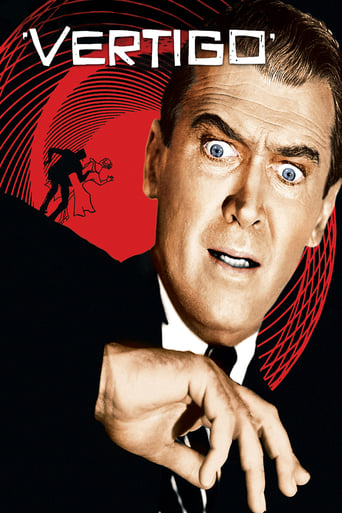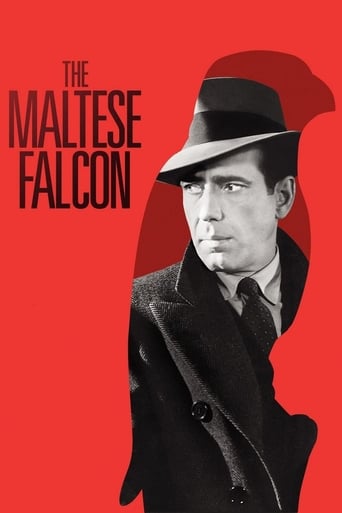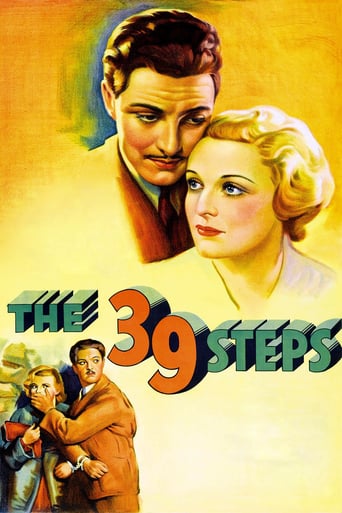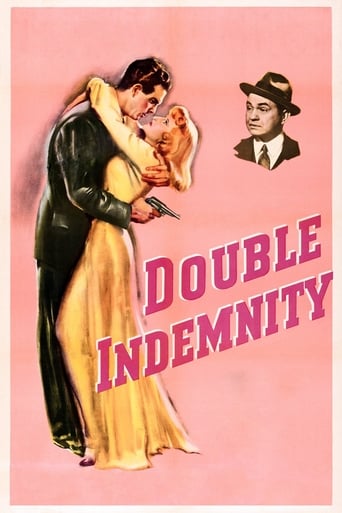The Blue Dahlia (1946)
Soon after a veteran's return from war his cheating wife is found dead. He evades police in an attempt to find the real murderer.
Watch Trailer
Cast


Similar titles
Reviews
Really Surprised!
The plot isn't so bad, but the pace of storytelling is too slow which makes people bored. Certain moments are so obvious and unnecessary for the main plot. I would've fast-forwarded those moments if it was an online streaming. The ending looks like implying a sequel, not sure if this movie will get one
I enjoyed watching this film and would recommend other to give it a try , (as I am) but this movie, although enjoyable to watch due to the better than average acting fails to add anything new to its storyline that is all too familiar to these types of movies.
Through painfully honest and emotional moments, the movie becomes irresistibly relatable
1946's "The Blue Dahlia" would be the 3rd (and final) pairing of actors, Alan Ladd & Veronica Lake in a feature film. (This time around Ladd/Lake were clearly a mismatched on-screen couple)But unlike their 2 previous films together ("This Gun For Hire" & "The Glass Key") - This decidedly mediocre crime/drama just did not measure up to its 2 classic "Noir" predecessors at all. With its screenplay penned by famed crime-fiction writer, Raymond Chandler - You'd honestly think that "The Blue Dahlia" would have really been charged with super-sizzling excitement.But, nope - Unfortunately - "The Blue Dahlia" was just a pedestrian-level "whodunnit" that was far too "clean-cut" for its own good.IMO - This film's overall inadequacy only served to undermine any hope of its story ever building at all into something with a more grittier edge to it.
When US Navy pilot Johnny Morrison returns home from the war in the Pacific he is understandably angered to find his wife partying with another man, Eddie Harwood, owner of the Blue Dahlia nightclub. She is far from apologetic. He threatens her with a gun put then tells her she isn't worth it before leaving her, and the gun. As he walks through the rain he is picked up by attractive blonde, Joyce Harwood, she is Eddie's ex although at this point in the story neither knows the others name.That night Johnny's friend Buzz, who is suffering from constant headaches and PTSD after a war injury, goes to find him but ends up meeting his wife. The next morning she is found dead and the police consider Johnny to be the prime suspect after the house detective tells them he caught the pair arguing. When Johnny hears about this he decides not to turn himself in; instead he checks into a cheap hotel; here he finds a message from his late wife on the back of a photograph; it suggests that Eddie is in fact a killer on the run a clear motive for murder.This is a pretty solid film noir from the pen of Raymond Chandler. We know that Johnny is innocent but there is a good sense of danger and a real mystery about who really did it; Buzz and Eddie may be the prime suspects but they aren't the only possibilities. The cast do a good job; Alan Ladd impresses as Johnny and Doris Dowling is delightfully unpleasant as his doomed wife. Veronica Lake is solid enough as Joyce; she is clearly meant to be the leading lady but her character is a little bland perhaps this seemed so because I was expecting her to be more of a femme fatale. The story does rely on coincidence a little too much but not enough to really bother me. The ending is the film's greatest weakness; I wasn't surprised to learn that this wasn't the ending that was planned but a last minute change to avoid having a returning serviceman shown as a killer. Overall this is a fine film noir that I'm sure fans of the genre will enjoy.
I've watched this movie over a few times recently, not because it's a flawless noir masterpiece—it isn't—but to enjoy the characterization, the period feel and that unique Chandler dialogue. The parts add up to much more than the whole, I'd say. In discussing some key moments below, I will avoid giving away any plot details or the ending.A word in defence of Doris Dowling (as Helen). There's lots of compassion for Buzz, whose war injury and experiences cause him to act erratically, but poor Helen gets little sympathy for her own trauma. We presume a good egg like Johnny wouldn't have married her if she'd been a bad sort, but she's accidentally caused the death of her little boy through negligence by driving while drunk (his photo is evidently Alan Ladd as a child). Unable to live with the crushing guilt, and with her husband the other side of the world, she's crawled into a bottle, something Chandler could write so well from experience. She spends her time tipsy, a lush surrounding herself with good-timers and having casual affairs to drown out the memory, just to get through the days. Then war-hero Johnny suddenly turns up and she's confronted with the man whose son she's killed. That dreadful guilt resurfaces and, bitter and self-loathing, she blurts out the whole sorry tale, baiting Johnny so she can make him hurt as she does (and probably to evoke enough hatred in him to make him mete out the punishment she deep-down feels she deserves). It works almost too well, though, as he pulls a gun on her—but, moments later, regaining his self-control, he walks out, deciding she isn't worth it. Later, regretful, she unsuccessfully tries to contact him, then takes off for the hotel bar.I feel it's unfair to criticize as 'hammy' or over-dramatic Dowling's acting in the bungalow scenes—it was George Marshall's job to get it just the way he wanted it and, whether laughing hysterically, wincing, or tugging absent-mindedly on the phone wire, Doris must have been closely following his directions.She seems nicely at home once at the bar, where some of my favourite moments take place. Buzz (in a coincidence too far, to be honest) wanders in as he waits to meet Helen then, almost by accident, picks her up, unaware she's the very woman he's waiting to see. For two solid minutes, she is cool, appealing, beautiful, and they share some cute mutual wisecracking. She and Buzz head off to her bungalow so he can make a call. When he hesitates momentarily, she stands in the pouring rain in her slinky outfit and looks back at him, taunting him playfully: "What's the matter? Scared?" She flashes a winsome smile and turns on her heel, an invitation no red-blooded male could resist (just as I couldn't resist that period term, sorry!) Unfortunately, Veronica Lake never gets quite such a seductive moment in this film. Anyone who knows Chandler's bio will appreciate why he will have identified far more closely with Helen's character than with any other in the drama.A typically underplayed Chandler one-liner crops up when Eddie learns from concerned business partner Leo that his beloved ex, Joyce (Lake), has left a message saying she's quit town 'to save money on flowers' as obviously, she was receiving too many of Eddie's signature blue dahlias Eddie (morosely): "She could have told me that herself." Leo: "Maybe she figured it would sound worse, coming from me."And Buzz's interplay down at the station house with the old cop is priceless, too.An imperfect film written by an imperfect man, sure, but with enough fine moments to satisfy any Chandler aficionado.
THE BLUE DAHLIA (Paramount, 1946), directed by George Marshall, reunites the popular trio of Alan Ladd, Veronica Lake and William Bendix from a Dashell Hammett mystery tale of THE GLASS KEY (Paramount, 1942), in another mystery tale, this one by author, Raymond Chandler. With the opening titles superimposed over the glittering dahlia over a nightclub, a viewer's first impression was to be seeing a nightclub melodrama casting Ladd as its proprietor, Lake the sultry blonde singer and mistress, and Bendix a rough and tough bouncer/ bodyguard. With that in mind, it's always fun after the completion of the opening credits to expect the unexpected, one of many reasons why THE BLUE DAHLIA has turned out so well upon its initial release. In later years, it's become one of Ladd's most televised movies in the sixties, seventies and part of the 1980s, and it's easy to see why.The story starts off with an introduction of three war buddies from World War II coming out of a Hollywood bus in the city of Los Angeles, California, to face a new world of civilian life: Johnny Morrison (Alan Ladd), a Navy lieutenant commander; "Buzz" Wenchek (William Bendix), a shell-shock victim with great sensitivity towards loud juke box "monkey" music; and George Copeland (Hugh Beaumont), an attorney by profession. As Buzz and George return to the apartment building they once lived before the war, Johnny comes to Cavendish Court, Bungalow 93, to surprise his wife, Helen (Doris Dowling). Upon his arrival, Johnny is shocked to find his wife drunk, hosting an all-night party for her drunken friends, and finding Eddie Harwood (Howard Da Silva), proprietor of The Blue Dahlia night club, kissing his wife. After the guests leave, Johnny comes to more bitter shock learning how his son, Dickie, actually died. During a quarrel, Johnny takes out his gun with the intent of killing Helen, but comes to the conclusion she's not worth it. Dropping the gun on the couch, he takes his belongings, leaving the hotel bungalow in disgust. While walking in the rain down the dark streets, a young blonde (Veronica Lake), driving to Malibu, offers him a ride. Before the night is over, Johnny and the blonde part company while Helen, having already entertained three separate visitors in the course of a few hours, is found dead the next morning by Jenny, the housemaid (Mae Busch) with a gun nearby. With Johnny the prime suspect, and Captain Hendrickson (Tom Powers) of the Los Angeles police questioning his friends, Johnny and the blonde continue to meet on different paths after several goodbyes. This time the blonde, believing Johnny innocent, helps him in his search for the real killer. Before coming upon evidence leading him to The Blue Dahlia, Johnny is surprised to find the blonde married to the man with possible motives for his wife's murder.Although the seems to be full of clichés and coincidences throughout, THE BLUE DAHLIA is still first-rate forties-style entertainment. With the Ladd-Lake combination working so well here as it did in their two previous screen efforts, it's a wonder how THE BLUE DAHLIA might have turned out had it starred Humphrey Bogart and Lauren Bacall (Warner Brothers); Tyrone Power and Linda Darnell (20th Century-Fox); Robert Mitchum and Jane Greer (RKO Radio); or John Hodiak and Gloria Grahame (MGM) in their place. With fate on their side, it's hard to imagine anyone other than Ladd-Lake in the leads. With THE BLUE DAHLIA being Ladd's film throughout (94 minutes), there's a brief time out for nightclub singer vocalizing to an old tune, "Easy to Remember" (by Richard Rodgers and Lorenz Hart). Of the supporting players, William Bendix stands out where he realistically goes through spells of mental blackouts, and gets some laughs where he gives a "copper" a hard time in the police department. Fans of the "Leave It to Beaver" TV series (1957-1963) should enjoy seeing Hugh Beaumont years before his legendary TV Dad role of Ward Cleaver. Let's not overlook Howard Da Silva's performance, along with other shady characters as Will Wright (The House Detective) and Don Costello (Leo).Distributed to home video (1998) and DVD (2014), notable cable TV broadcasts consist of American Movie Classics (1995-1999) and Turner Classic Movies (TCM premiere: December 15, 2001). With SHANE (Paramount, 1953) labeled as Ladd's best screen performance, THE BLUE DAHLIA comes a close second, thanks to his confident tough guy image. Though not as well-known as some of the other notable film noir contemporaries from that era, THE BLUE DAHLIA is recommended without hesitation, even for not being a full-fledged nightclub melodrama as the opening credits promised. (***1/2)

